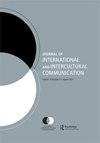美国大学国际助教污名化经历的专题分析:英语水平决定论
IF 2.2
Q2 COMMUNICATION
Journal of International and Intercultural Communication
Pub Date : 2020-05-28
DOI:10.1080/17513057.2020.1762110
引用次数: 2
摘要
摘要本研究采用主题分析法调查了美国某大学14名国际助教的污名化经历。林克和费伦出版社(2001)。概念化的耻辱。社会学年鉴,27(1),363-385)采用污名化的四要素模型,分析了这些移民如何经历标签化、刻板印象、分离和地位损失-歧视。研究结果表明,一些外籍教师经历了来自国内学生、他们的导师、他们的部门甚至他们自己的耻辱。这种耻辱经历导致了英语水平决定论,这种决定论过度概括了仅基于英语水平的ita的专业知识和学习教学经验。本文讨论了改善ita沟通体验的实际意义。本文章由计算机程序翻译,如有差异,请以英文原文为准。
A thematic analysis of international teaching assistants’ stigma experience in a U.S. university: English-proficiency determinism
ABSTRACT The current study adopted a thematic-analysis approach to investigate 14 international teaching assistants’ (ITAs) stigma experience in a U.S. university. Link and Phelan’s (2001. Conceptualizing stigma. Annual Review of Sociology, 27(1), 363–385) model of four components of stigma is adopted in this article to analyze how these ITAs experienced labeling, stereotypes, separation, and status loss-discrimination. The findings suggested that some ITAs experienced stigma from domestic students, their supervisors, their departments, and even themselves. Such stigma experiences result in English-proficiency determinism that overgeneralizes ITAs’ expertise and learning-teaching experiences based on English proficiency levels alone. The practical implications for improving ITAs’ communication experiences are discussed in the paper.
求助全文
通过发布文献求助,成功后即可免费获取论文全文。
去求助
来源期刊

Journal of International and Intercultural Communication
COMMUNICATION-
CiteScore
3.80
自引率
12.50%
发文量
19
 求助内容:
求助内容: 应助结果提醒方式:
应助结果提醒方式:


